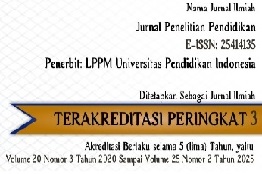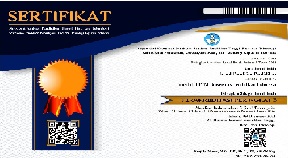Technology Enhanced Project-Based Learning in Teacher Education: Experience of Pre-service EYL Teachers
Abstract
Abstract
21st century education requires teachers to integrate technology, subject matter and pedagogy in a systematic manner. To help pre-service teachers create appealing lessons to young English learners’ styles and strategies in digital era, technology cannot be taught separately. This paper highlights 6 prospective English teachers’ actual experience of the process they went through as preparing digital teaching resources for young English language learners. Employing narrative inquiry, the experiences of 6 students were gathered by means of oral narrative and narrative frames. The data then were analysed using an inductive content analysis. The findings show that while the pre-service teachers encountered some difficulties during the process, they value the projects to exercise their critical thinking, communication and technology skills. They also mention that the project allows them to apply their pedagogical knowledge about young learners’ learning styles and strategies. All in all, they believed the experience would benefit their pedagogical and professional competence in the current digital era.
Keywords
Full Text:
PDFReferences
Abualbasal, A. M., & Badran, R. E. (2019). From course project to entrepreneurship: The case of engineering students at princess sumaya university for technology. Journal of Entrepreneurship Education, 22(5), 2651.
Avidov-Ungar, O., & Tsybulsky, D. (2021). Shaping teachers’ perceptions of their role in the digital age through participation in an online pbl-based course. Electronic Journal of E-Learning, 19(3), 186–198. https://doi.org/10.34190/ejel.19.3.2300
Barkhuizen, G., Benson, P., & Chik, A. (2013). Narrative inquiry in language teaching and learning research. ro. https://doi.org/10.1093/elt/ccu076
Belda-Medina, J. (2021). ICTs and Project-Based Learning (PBL) in EFL: Pre-service Teachers’ Attitudes and Digital Skills. International Journal of Applied Linguistics and English Literature, 10(1), 63. https://doi.org/10.7575/aiac.ijalel.v.10n.1p.63
Brennan, R. W., Hugo, R. J., & Gu, P. (2013). Reinforcing skills and building student confidence through a multicultural project-based learning experience. Australasian Journal of Engineering Education, 19(1), 75–85. https://doi.org/10.7158/D12-015.2013.19.1
Çakici, D. (2016). The use of ICT in teaching English as a foreign language. Participatory Educational Research (PER), 4(2), 73–77. http://www.partedres.com
Casillas Martín, S., Cabezas González, M., & García Peñalvo, F. J. (2020). Digital competence of early childhood education teachers: attitude, knowledge and use of ICT. European Journal of Teacher Education, 43(2), 210–223. https://doi.org/10.1080/02619768.2019.1681393
Dooly, M., & Sadler, R. (2016). Becoming little scientists: Technologically-enhanced project-based language learning. Language Learning and Technology, 20(1), 54–78.
Insyasiska, D., Zubaidah, S., Susilo, H., Biologi, P., & Malang, U. N. (2015). Pengaruh Project Based Learning Terhadap Motivasi Belajar , Kreativitas , Kemampuan Berpikir Kritis , Dan. Jurnal Pendidikan Biologi, 7(1), 9–21.
Ismaili, A. A. (2021). ICT Use in the EFL Classroom in Morocco. International Journal of Information and Communication Technology Education, 18(1), 1–13. https://doi.org/10.4018/ijicte.286759
Jaya, A., & Rosmiyati, E. (2019). The implementation of project-based learning in increasing speaking achievement and self-confidence. Indonesian Educational Administration and Leadership Journal (IDEAL), 1(1), 4–14.
Koparan, T., & Guven, B. (2014). The Effect on the 8th Grade Students’ Attitude towards Statistics of Project Based Learning. European Journal of Educational Research, 3(2), 73–85. https://doi.org/10.12973/eu-jer.3.2.73
Koşar, G. (2021). Pre-Service English-as-a-Foreign-Language Teachers’ Views on Their Experiences of Project Preparation for Young Learners: “I Felt Like a Real Teacher.” International Journal of Educational Reform, 30(3), 183–203. https://doi.org/10.1177/10567879211015947
Krajcik, J. S., & Shin, N. (2014). Project- based learning. In R. K. Sawyer (Ed.), The Cambridge handbook of the learning sciences (pp. 275–298). Cambridge University Press.
Li, Y., & Ranieri, M. (2010). Are “digital natives” really digitally competent?-A study on Chinese teenagers. British Journal of Educational Technology, 41(6), 1029–1042. https://doi.org/10.1111/j.1467-8535.2009.01053.x
List, A. (2019). Defining digital literacy development: An examination of pre-service teachers’ beliefs. Computers and Education, 138(May 2018), 146–158. https://doi.org/10.1016/j.compedu.2019.03.009
Lubis, A. H. (2018). Integrasi TIK dalam pengajaran bahasa inggris di Indonesia abad ke-21: mitos dan realita. Cakrawala Pendidikan, 37(1), 11–21. 1
Lubis, N., Lubis, A., & Purba, N. B. (2020). Project-Based Learning Collaborated With Digital Media for Indonesian Efl Learners’ Self-Confidence and Communication Skill. Jurnal Pendidikan Dan Pembelajaran Terpadu (Jppt), 02(Vol. 2 No. 1 (2020): JPPT Juni 2020), 10–17. https://jurnal-lp2m.umnaw.ac.id/index.php/JPPT/article/view/440/357
Mishra, P., & Koehler, M. J. (2006). Technological Pedagogical Content Knowledge: A Framework for Teacher Knowledge. Teachers College Record: The Voice of Scholarship in Education, 108(6), 1017–1054. https://doi.org/10.1177/016146810610800610
Nandiana, V., Jaelani, A., & Afiyattena, N. (2021). Promoting Students’ Confidence Through Video Project-Based Learning. Journal of English Language Learning, 5(2), 87–94. https://doi.org/10.31949/jell.v5i2.3374
P21. (2007). Framework for 21st century learning. P21 Partnership for 21st Century Learning, 2. http://static.battelleforkids.org/documents/p21/P21_framework_0816_2pgs.pdf%0Ahttp://www.p21.org/our-work/p21-framework
Park, H., & Hiver, P. (2017). Profiling and tracing motivational change in project-based L2 learning. System, 67, 50–64. https://doi.org/10.1016/j.system.2017.04.013
Tseng, S.-S., & Yeh, H.-C. (2019). Fostering EFL teachers’ CALL Competencies Through Project-based Learning. Journal of Educational Technology & Society, 22(1), 94–105
DOI: https://doi.org/10.17509/jpp.v24i1.69283
Refbacks
- There are currently no refbacks.
Copyright (c) 2024 Jurnal Penelitian Pendidikan
ISSN: p.1412-565X e.2541-4135
Jurnal Penelitian Pendidikan (JPP), Universitas Pendidikan Indonesia 
This work is licensed under a Creative Commons Attribution-ShareAlike 4.0 International License


